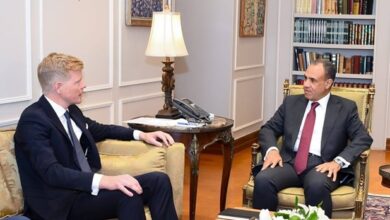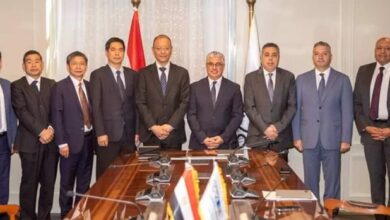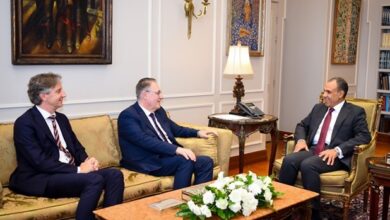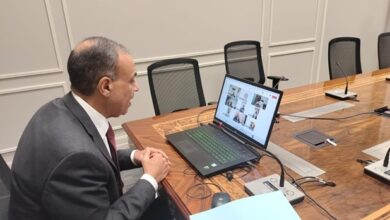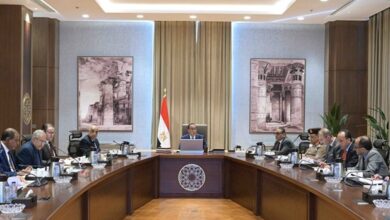Shourky, his French counterpart assert depth of Cairo-Paris cooperation, joint coordination

Minister of Foreign Affairs Sameh Shoukry and French Minister for Europe and Foreign Affairs Stéphane Séjourné affirmed the depth of the cooperative relations between Cairo and Paris, highlighting the close bilateral coordination on issues of mutual interest.
This came during a joint press conference held by the ministers on Sunday at the conclusion of their talks at the Ministry of Foreign Affairs premises in the New Administrative Capital.
Shoukry welcomed his French counterpart at the beginning of the conference, noting that the visit is the first of its kind by Séjourné to Cairo since assuming his new position. He added that the French minister met with President Abdel Fattah El-Sisi as they reviewed the overall relations between Egypt and France, considering the regional developments in light of the strategic ties between the two countries.
Shoukry noted that his discussions with his French counterpart focused on emphasizing the importance of the relations between the two countries, which have historical foundations and cultural ties at the level of the two peoples.
He pointed out that in the recent period, the relations have evolved to a higher level of mutual trust, becoming strategic in politics, economics, and militarily, serving the interests of both nations. He expressed the anticipation of further developing the relations, emphasizing a common vision on various issues.
The talks also addressed the situation and the ongoing conflict in Gaza, stressing the importance of reaching a ceasefire, allowing the entry of aid, and condemning outright displacement and ongoing practices in the West Bank and Gaza, added the Egyptian diplomat.
Shoukry stated that there is coordination between Egypt and France within the multilateral framework, emphasizing the relationship between Egypt and the European Union and France’s prestigious and leading position within the Union. This is particularly significant as Egypt aims to establish a comprehensive strategic relationship with the European Union, and France’s support for Egypt within the Union is highly important, the minister noted.
He added that the discussions addressed the situation in Gaza, expressing complete rejection and opposition to any displacement, whether as a resolution to the Palestinian issue or as a burden imposed on others, whether in Gaza or the West Bank. The ongoing military practices in Gaza and the West Bank, as well as the displacement of the Palestinian people in Gaza from the north and the center to the south, were also discussed, the diplomat said, highlighting the extensive damage inflicted on civilians and the continued military targeting of southern Gaza.
The importance of a ceasefire was emphasized to create conditions for initiating a political framework to address the Palestinian issue comprehensively, whether in relation to Gaza post-war or the necessity of dealing with the issue from a holistic political perspective within the framework of a political solution, the minister noted.
Furthermore, Shoukry pointed out that the international community agreed that this is the only solution to end the Israeli-Palestinian conflict. It is imperative to establish a timeframe for the establishment of the Palestinian state and address all related issues, including the administration of Gaza, the responsibility of the Palestinian National Authority, ensuring stability and security for Israel, releasing detainees, and broader political considerations linked to the establishment of the Palestinian state, he went on to say.
He emphasized that these components cannot be separated, and they must be addressed collectively.
The discussions with the French counterpart also touched on the dangers of the widening conflict in the Middle East, including the war in Gaza, threats to navigation in the Red Sea, military actions in Syria and Iraq, as well as developments in the military situation along the Israeli-Lebanese border, Shoukry said. These developments signal a worsening situation and the possibility of sliding into a broader conflict, which Egypt seeks to avoid by calling for a ceasefire in Gaza and addressing the issues from a comprehensive political perspective, he added.
Shoukry affirmed the continued close communication with the French minister and all relevant authorities in both countries to sustain joint efforts and confront common challenges, adding that within the bilateral framework, efforts are ongoing to enhance relations and ensure the continued contribution of French companies to Egypt’s developmental endeavors in recent years.
Shoukry pointed to economic cooperation and the contribution made by France at the governmental level in supporting Egypt’s development efforts. He also highlighted the significant importance of the financial package for many major national projects and infrastructure-related projects, emphasizing the various areas and prospects to increase bilateral trade volume, boost French investments, and leverage Egypt’s relations with Middle Eastern and African countries. Simultaneously, he emphasized the strong cultural ties between Egypt and France.
Shoukry added that the French minister highly appreciated the cultural and historical connections between the two countries, spanning over two centuries, reflecting France’s profound interest in Egyptian civilization, contemporary culture, and Egypt’s advancements in art, education, and innovation. He mentioned Egypt’s desire to benefit from the French educational systems.
Regarding coordination on regional and international issues, Shoukry stated that Egyptian policy is formulated on principles, including adherence to the United Nations Charter and the necessity of working within a framework of international relations based on mutual respect for each state’s sovereignty, common interests, and positive efforts to achieve stability and security without destabilizing policies or conspiracies.
In terms of regional issues, Shoukry noted the ongoing support for the establishment of the Palestinian state, ending the Israeli-Palestinian conflict based on the principle of a two-state solution, and achieving stability, peace, and security for both peoples and the region. He emphasized that the benefits of resolving the conflict and regional engagement are particularly valuable given the Middle East’s connection through the Mediterranean with North Mediterranean countries, notably France.
Shoukry clarified that the security-military relationship in the bilateral framework has supported Egypt’s capabilities in facing challenges, striving to be a force for stability in the region. He highlighted shared perspectives on issues such as combating illegal migration, resistance, and the eradication of terrorism.


